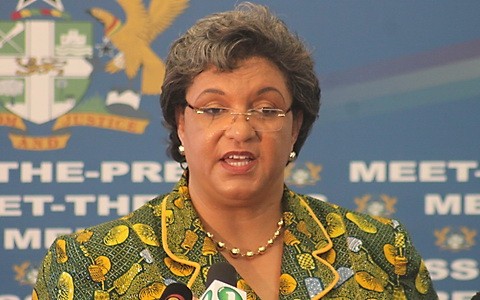Hanna Tetteh, former Minister of Foreign Affairs, has raised pertinent questions regarding the role of public opinion in the decision-making process of Ghana’s Supreme Court.
In a post on Facebook, she explored whether the highest court in the land takes into account public sentiment when delivering judgments, especially in politically charged cases such as the recent ex-parte decision challenging the Speaker of Parliament’s ruling on vacant seats.
Hanna Tetteh begins by acknowledging the critical role of the judiciary in interpreting and applying the law without fear or favour. However, she also argues that judges make these decisions within the broader context of Ghanaian society, which includes not just the litigants and legal professionals, but also the business community, investors, religious actors, unions, civil society, and the general public.
“Do they listen to public commentary and reflect on the implications of their decisions and how these are received by the wider society?” she asks, noting that while the court’s primary responsibility is to uphold the law, the broader social, economic, and political environment cannot be ignored.
She points out that as Ghana approaches another election cycle, the political climate is becoming increasingly tense, and the stakes are higher for maintaining peace and security. According to Tetteh, this hyper-partisan atmosphere makes the role of the judiciary even more crucial.
The Court’s decisions can influence not only legal outcomes but also the delicate balance of power and stability in the country.
Hanna Tetteh argues that while the judiciary must remain independent and free from undue influence, they operate within a society where their decisions have far-reaching consequences.
“In these fragile times, we need a judiciary that understands its pivotal role in ensuring not only that the laws are applied justly, but that democracy not only survives but thrives,” she concludes.
The Recent Supreme Court Ruling on Speaker Bagbin’s Decision
Hanna Tetteh’s post follows the recent Supreme Court ruling on October 18, 2024. The case involved the Speaker of Parliament, Alban Bagbin, who had declared four parliamentary seats vacant on October 17, 2024.
Three Members of Parliament (MPs) had announced their intention to contest the 2024 general elections as independent candidates, leading Bagbin to declare their seats vacant.
Additionally, the Second Deputy Speaker, Andrew Amoako Asiamah, who left the NPP and won the 2020 election as an independent MP, also announced plans to contest on the NPP’s ticket in 2024.
Bagbin’s decision, if implemented, would have shifted the balance of power in Parliament, giving the opposition National Democratic Congress (NDC) a slim majority with 136 seats to the NPP’s 135.
The ruling was expected to significantly affect the dynamics in Parliament and the 2024 election campaign.
However, the Supreme Court, in a unanimous ruling, stayed the execution of Bagbin’s decision. This ruling effectively reversed the Speaker’s declaration and maintained the status quo in Parliament until further legal proceedings.
The court’s decision raised many eyebrows, with critics questioning whether the judiciary was overstepping its boundaries and undermining the authority of the Speaker of Parliament.
Below is the full post
When the Justices of the Supreme Court take their decisions, or make orders in whatever circumstances, not just in the context of the recent ex-parte decision against the Speaker’s ruling, do they listen to the public commentary and reflect on their decision, its implications and how it has been received not only by the parties to the particular suit or in a case with political undertones the legal profession, the businesses/investor community, the diplomatic community, religious actors, the unions, civil society and other key social actors?.
Of course they are expected to interpret the law and ensure its application without fear of favour but they do so within the context of the society that the laws govern.
We live in hyper-partisan times, and the closer we get to elections the more tense the political environment, and consequently the times when peace and security within the state is at its most fragile.
A strong, principled judiciary is essential to a competitive but peaceful democracy. They have an important role to play in ensuring this democracy not only survives, but thrives.


